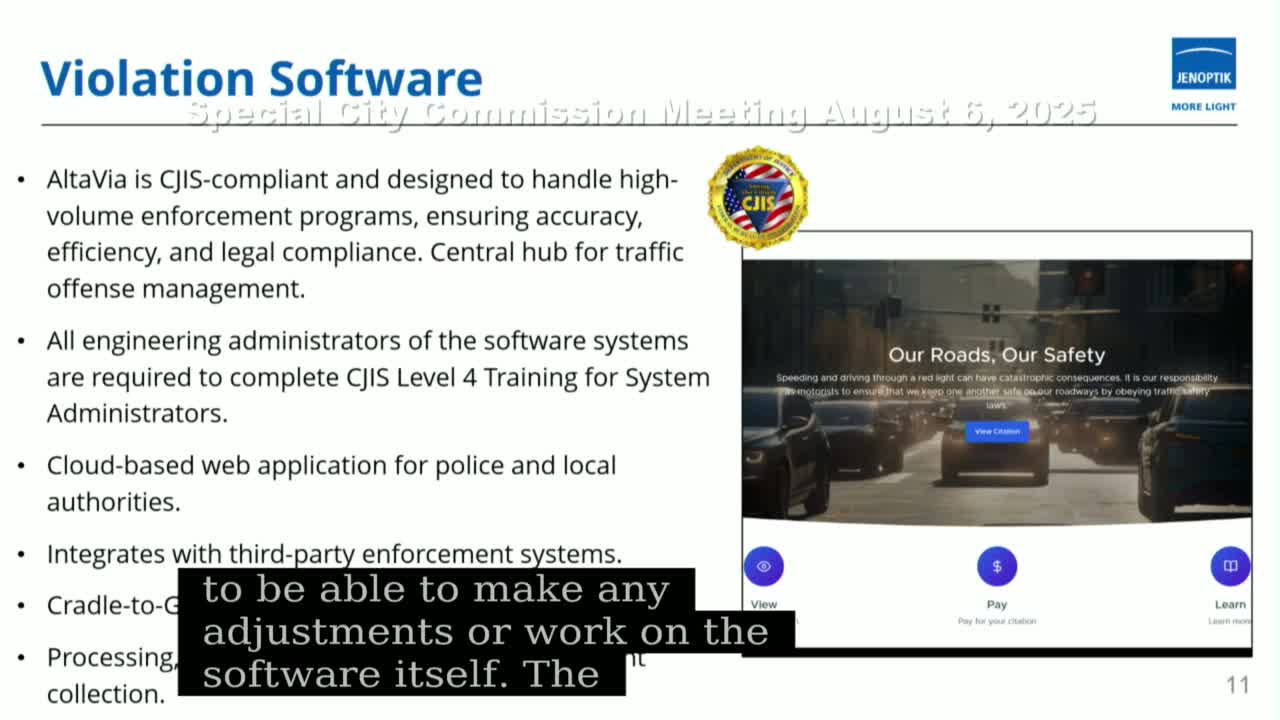Genoptic Collaborates With Wellington Officials on School Zone Speed Enforcement Program
August 06, 2025 | Hallandale Beach, Broward County, Florida
This article was created by AI summarizing key points discussed. AI makes mistakes, so for full details and context, please refer to the video of the full meeting. Please report any errors so we can fix them. Report an error »

On August 6, 2025, Hallandale Beach officials convened for a Special City Commission Budget Workshop, focusing on the implementation of a new automated speed enforcement program aimed at enhancing safety in school zones. The meeting highlighted the procedural framework for addressing speeding violations and emphasized the importance of public education in conjunction with the program's rollout.
The proposed system will involve a two-step internal review process for detected speed violations. If a potential violation is confirmed, it will be forwarded to the police department for approval. The police will have the option to either approve or reject the violation. Approved violations will result in a notice being mailed to the offending driver, while rejected cases will be discarded. Importantly, the technology provider, Genoptic, assured that they will not have any control over the approval process, emphasizing that the police department retains full authority.
A significant aspect of the program is the public education campaign, which is mandated by law. Genoptic representatives committed to collaborating with city officials to create a comprehensive website that will address frequently asked questions about the program, including details on locations, payment processes, and operational timelines. They recommended notifying the public 90 days prior to the program's launch to foster awareness and understanding.
The meeting also discussed the strategic placement of speed enforcement systems within school zones. By installing these systems inside the zones, drivers will be alerted to slow down before entering areas with heightened pedestrian activity. This approach aims to modify driver behavior positively, reducing the likelihood of speeding in sensitive areas.
The implementation timeline includes a 30-day warning period, during which drivers caught speeding will receive a warning notice rather than a fine. This grace period is intended to encourage compliance and raise awareness about the new enforcement measures. Following this period, any further violations will result in a formal notice of violation, allowing drivers 30 days to respond.
Overall, the discussions during the workshop underscored the city’s commitment to improving safety for students and pedestrians while ensuring transparency and community engagement throughout the process. The next steps will involve finalizing the public education strategy and preparing for the program's official launch.
The proposed system will involve a two-step internal review process for detected speed violations. If a potential violation is confirmed, it will be forwarded to the police department for approval. The police will have the option to either approve or reject the violation. Approved violations will result in a notice being mailed to the offending driver, while rejected cases will be discarded. Importantly, the technology provider, Genoptic, assured that they will not have any control over the approval process, emphasizing that the police department retains full authority.
A significant aspect of the program is the public education campaign, which is mandated by law. Genoptic representatives committed to collaborating with city officials to create a comprehensive website that will address frequently asked questions about the program, including details on locations, payment processes, and operational timelines. They recommended notifying the public 90 days prior to the program's launch to foster awareness and understanding.
The meeting also discussed the strategic placement of speed enforcement systems within school zones. By installing these systems inside the zones, drivers will be alerted to slow down before entering areas with heightened pedestrian activity. This approach aims to modify driver behavior positively, reducing the likelihood of speeding in sensitive areas.
The implementation timeline includes a 30-day warning period, during which drivers caught speeding will receive a warning notice rather than a fine. This grace period is intended to encourage compliance and raise awareness about the new enforcement measures. Following this period, any further violations will result in a formal notice of violation, allowing drivers 30 days to respond.
Overall, the discussions during the workshop underscored the city’s commitment to improving safety for students and pedestrians while ensuring transparency and community engagement throughout the process. The next steps will involve finalizing the public education strategy and preparing for the program's official launch.
View full meeting
This article is based on a recent meeting—watch the full video and explore the complete transcript for deeper insights into the discussion.
View full meeting